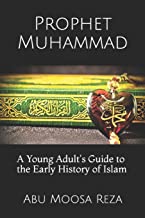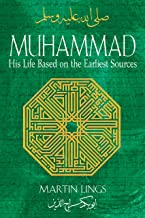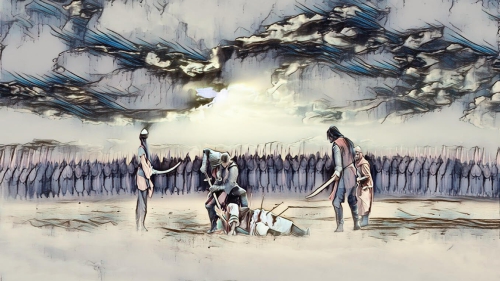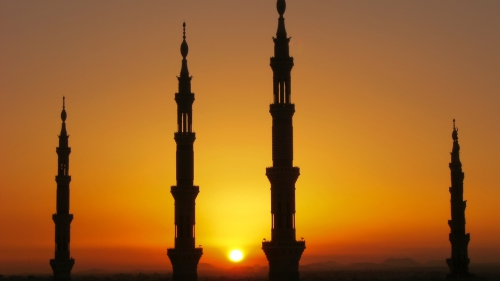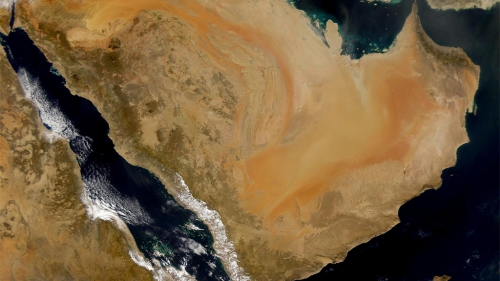Muhammad (PBUH), the Human Messenger
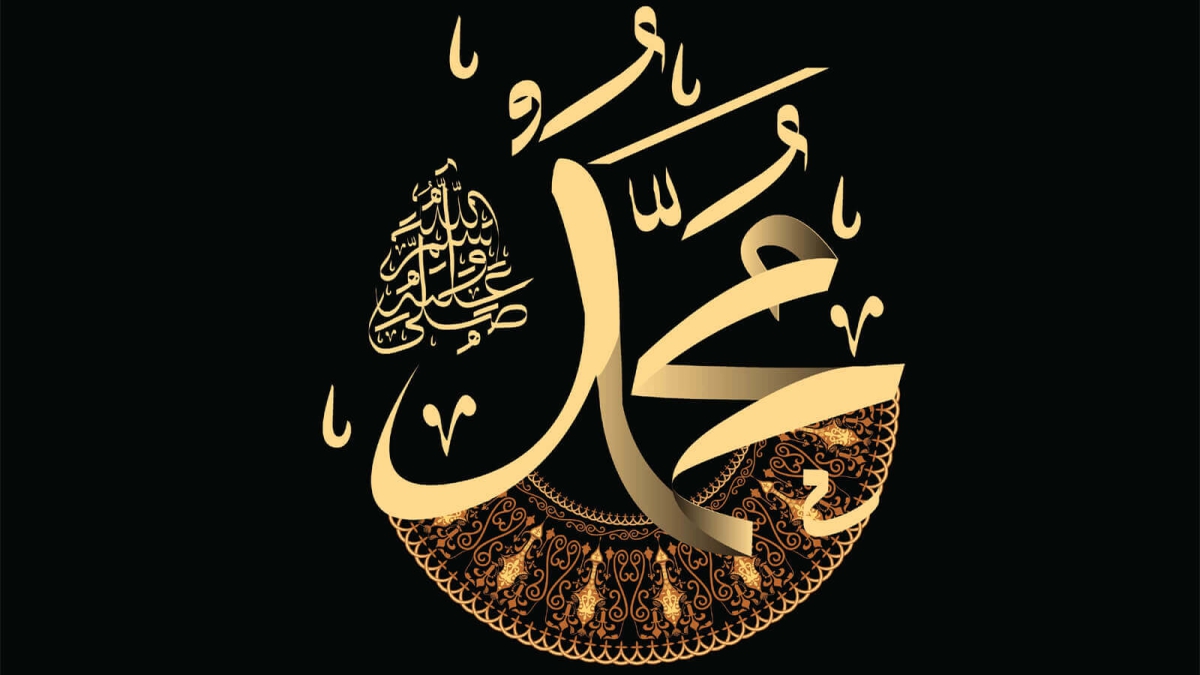
If the “psychoanalytic” approach adopted by some orientalists, such as Maxim Rodensen, lacks credible scientific proofs in stripping Muhammad (pbuh) from every “supernatural” attribute that includes prophethood – and limiting his status to mere being psychologically genius; the approach that contradicts it is equal to it in lacking scientific touch, the approach that nearly stripped the Messenger (pbuh) of his human character.
This is the practice of some writers who exaggerated in exalting the Messenger of God until they made him entirely a tool that does not move except at the instigation of the heaven, regardless of the type of movement.
This derogatory conception of the position of the owner of the concluding message is almost prevalent among some Islamic schools of thought. These thoughts created the danger of depriving the Prophet his exemplary attribute when he is described as a mythological demigod. How do we want people to emulate someone who is even inferior to robot!
Excessive exaltation of the Messenger of God’s rank, and the wild adoption of this creed while ignoring the verse “I am only a human being like you” [Al-Kahf: 110] reflects negatively on the culture of Muslims both in religion and elsewhere. Since the details of this cannot be comprehended by one article, thus the article focuses on two areas, Islamic propagation work (Da’wah) and legislative.
The preaching messenger
It is certain that mental abilities are not the final stage for the realization of the universal truths because human mind also requires a principle that would unlock it , and it is the divine revelation that can provide such a principle. It is actually from this revelation the Messenger (pbuh) who is charged with calling people to the religion of God draws the principle, vision and its application dimensions. In another word, the da’wah methodologies, approaches and details of da’wah are all gained though this principle.
As a result, all the accounts that claim the Prophet’s actions and inactions (pbuh) to be outright governed by the divine revelation are inaccurate. This issue can be clearly established by some instances:
1. The almighty God does not choose a person for prophethood on account of the moral considerations only. Rather, He chose the prophet -in addition to the mentioned- for his perfect quality, including the heart (the moral-spiritual aspect), the mind (the voluntary-intellectual aspect) and the limbs (the behavioral-creative aspect). That is why Qur’an describes the prophets with qualities like “the men of strength (limbs) and insight (hearts and minds).
2. The Prophet’s biography showed that the Messenger embarks on the Da’wah mission as instructed by the Almighty God. He strives to perfect that work until it yields good results in full. The revelation on the other hand focuses on the correction process when needed (for instance, the prisoners of Badr and the blind case mentioned in Surat Abas).
3. The seal of prophethood with Muhammad (pbuh) places upon his followers the tasks of da’wah continuity and this requires that the Prophet’s tradition would explain the method that his followers muse employ either from his practical qualities or from the guidance in the Holy Quran. However, if the whole matter is instructed only by revelation, be it the methods, means and details, then the method disappears with the death of the one who embodies it, the Messenger of God – may God’s blessings and peace be upon him -.
Ignoring the presence of human effort in the Prophet’s method of conveying the message of the religion of God exposed us to situations of unfortunate incapacity to assess the reality of people and deliver the mission accordingly under intellectual ambiguity and wrong interpretations.
The revelation is the main drive for the development and growth in our history, starting with the Prophet’s biography. But this does not mean that the Messenger was just a moving machine. For this could be the worst adjective attributed to the Prophet. It is even impolite to present him as such. The Prophet (pbuh) was highest point of excellence in his emotions, and his mental and practical abilities, so he was chosen to carry the message “And Allah knows best where to place His message” [Al-An’am: 124]. Thus, the Prophet (pbuh) was mentally and practically diligent in implementing the commands of God, whose revelation is often limited in determining the phases of his Da’wah (like the secrecy phase of Da’wah, the clan, the relatives, and the public da’wah). The revelation explains this aspect by the mention of goals and objectives. The example of this can be identified from the below two instances:
“Stand up and warn”
When the Messenger received this command, there is no evidence that he had received it, accompanied by a detailed plan drawn up by the revelation. Rather, it is certain that he – may God’s blessings and peace be upon him – understood the goal and purpose, so he rose and put together a practical plan that began with the presentation of Islam to those he saw as being closer to responding. From all the subdivisions of the Quraysh and the loyalists, and formed from them the solid basis for the new religion, then chose the method of warning his closest clan, then the method of opening up, and so on… God Almighty has entrusted the methods of implementation to the Messenger himself because of his miraculous abilities (meaning very great, not in the sense of a miracle) that makes him greater Mujtahid at all. If his behavior was mixed with some natural human weakness, the revelation intervened and corrected it immediately and indicated it to the best and the preferable for that is like his diligence – may God’s blessings and peace be upon him – to engage with the people of Quraysh than to answer a blind man’s question.
Peace of Hudaybiyah
No evidence has been established that the provisions of the treaty of Hudaybiyah were a revelation. Rather, we can be certain of the opposite. If it were to be a revelation, the Prophet would have informed the Companions of it, and none of them would be reluctant to accept it as it happened. What is important here is that the Messenger received a sign, (His she-camel knelt down) from God Almighty. From which he understood that he will not perform Umrah this year and that the matter will end with a certain peaceful or combative friction with the Quraish, so he wished that the friction would be peaceful and announced in front of his companions his readiness to conclude peace with the enemy and said, “Quraish would not invite me today to a plan in which they honor the relationship of kinship unless I give it to them.” his negotiation with Quraysh delegations shows a great ingenuity, as he gave up some details and shapes in order to achieve great goals. Most importantly, the establishment of security across Arab peninsula and the spread of freedom among the people. This indicates once again the mental abilities of the Messenger of God and his sophistication as a caller to God, which is what should be bequeathed to the workers of Islam in addition to the necessary provision of guidance of the revelation to bring about a positive balance that produces efficiency and allows the ummah to go far in its civilized project. This cannot be achieved by the unseen element alone, without the need for human innovations and input. With this a Muslim would hold a complete understanding of the verse of Surat Al-Kahf “I am only a human being like you, I am, being revealed to” and the verse of Surat Al-Isra, “Say, Glory be to my Lord, were I only but a human being, a messenger” [verse: 93], for a Muslim is a human being, and if the revelation no longer descends on the earth, it is available in the glorious Book and the Sunnah of the Prophet (pbuh).
Prophetic deeds
If we accept the humane of the Prophet, not only in principle, but also in practice and reality, then it becomes easy to accept that his actions – even after the mission – are not all conveying from God, and we are with the majority of Shariah law fundamentalists in that everything that comes out of the Messenger is considered legislation unless a presumption is based on otherwise. We confirm that there are many evidences that make part of his behaviors to fall among the acts of an ordinary human being (a husband, a father and a friend) and as a political ruler (sending armies, appointing governors, allocating budgets..) and as a judge (the adjudication of financial and physical disputes…).
We know that the fatwa and the judiciary enacted from him – may God’s blessings and peace be upon him – are both an application of legislation and not necessarily legislation. As for the area in which his behavior remains an evidence until the Day of Resurrection, it is the communication of the religion and what it contains of defining acts of worship, answers to religious questions, and informing of unseen issues. This classification in the aspect of legislation is necessary to avoid confusion and confining to apparent literal meaning which results in wasting time and intelligence, from this group who limits the ruling of sheria’h to sectional affairs, branches, and apparent texts, and neglects the universal principles, and purposes of Sheria’h. The group claims by doing this it adheres to the tradition of Messenger – may God’s blessings and peace be upon him – in everything.
Using this classification would prevent us from being wrongly strict in applying Islamic rulings where it is not necessary and help in promoting deep understanding. An example is what we can learn from the action of Abu Dharr – may God be pleased with him – who rejected this classification and considered all the actions of the Prophet (Pbuh) as divine messages from God. In this regard, he prohibited hoarding money and saving it in any form based on the hadith “I do not like that I have the equivalent of Uhud in gold, except that I spend all of it except for three dinars” (Agreed upon). But the majority of the Companions – including Uthman, may God be pleased with him – understood that the hadith is not a general ruling. It rather teaches highest degree of noble acts and belief.
We conclude from this that the main function of the Prophet – may God’s blessings and peace be upon him – is the propagation of message to the ummah, along with other political, judicial and human functions. These function may sometimes fall under permissibility, or sometimes under his personal preference. However these functions cannot be viewed as a standard general legislation. It is actually a common mistake when this distinction is not recognized. For this reason, a group of people who want to oblige Muslims to perform all prophetic actions, even if they were from the custom and have nothing to do with religion. Like we see some efforts and lives were lost in fierce battles over some Arab customs governed by time and place, as if they were a revelation from the Almighty Allah. This is due, in my estimation, to the wrong perception about the Prophet as person. Considering his divine side (i.e., receiving revelation) alone without paying attention to his human nature leads to confusion in the areas of da’wah and legislation. Meanwhile, the right way is to analyze the Prophet (Pbuh)’s life with a balance view, once as a prophet and other time as a human being. With this, there is balance in the perception, and enables Muslims to consciously follow him and embrace Islamic way according to his guidance, and before that, follow the call with insight, a matter that softens hearts and convinces minds.
This shift cannot be clarified in an article as desired. It should rather be a revised intellectual system devoid of false interpretations. It’s topics should be addressed from the fundamental Islamic objectives of the Qur’an, the Sunnah and the Prophet’s biography. Its focus should be the Messenger as a good example, far from Christian extremism and orientalist denial.
( Source: Islam Online )
Topics: Dawah (Outreach), History, Hudaibiya Treaty, Islamic Law (Sharia), Prophet Muhammad (S), Seerah, Ummah (Community) Values: Guidance
Views: 1710
Related Suggestions






